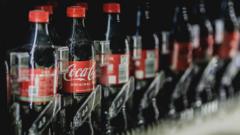Maxime Chapoutier's new wines, blending French and Australian grapes, spark debate in the wine community as they embrace globalization.
**A New Era for Global Wine: Chapoutier's Controversial Blends Make Waves**

**A New Era for Global Wine: Chapoutier's Controversial Blends Make Waves**
A daring winemaker challenges France's strict wine laws with international blends.
Maxime Chapoutier, a prominent French winemaker, is stirring the pot in the wine industry with his latest creations: two new blends that defy the stringent regulations of his home country. The wines, dubbed Hemispheres Red and Hemispheres White, combine French grapes with Australian varieties—an illegal move under both French and EU law. "There would likely be outrage about these wines in France, and that would be a good thing," Chapoutier contends, advocating for necessary provocations to instigate change within a traditional industry.
Chapoutier's bold experimentation is made possible post-Brexit, as the United Kingdom has unbound itself from EU wine regulations. Consequently, the wines cannot be sold within Europe, but they’re now marketed in the UK through online retailer The Wine Society. Hemispheres Red features Australian shiraz grapes, while Hemispheres White includes a blend of Marsanne and Viognier from both countries. The wines are produced by shipping bulk components from Australia to the UK, where they'll be blended before bottling.
A respected figure in France's biodynamic wine culture, Chapoutier acknowledges the significance of "terroir"—a term denoting the environmental nuances that characterize wine regions. Nevertheless, he believes the wine market must adapt and become more accessible, arguing that global blends offer an innovative experience. He also highlights the environmental benefits of shipping large quantities in bulk, reducing packaging waste.
The move towards international blends isn't exclusive to Chapoutier; Australian company Penfolds similarly blends grapes from different countries, although these products also remain excluded from the EU market. While some winemakers and wine critics express concerns over potential dilution of local character and quality, others, like wine writer Jamie Goode, view the concept as an exciting opportunity for creativity and skill in wine crafting.
Peter Richards, a master of wine, articulates a common skepticism within the sector, emphasizing the importance of maintaining quality and authenticity in the pursuit of novelty. Conversely, industry experts at The Wine Society have framed this approach as a forward-thinking strategy, compatible with climate change adaptation.
As Chapoutier forges ahead with his unconventional blends, the wine community stands divided—reflecting wider tensions between tradition and innovation in an increasingly globalized market. While some cling to the importance of terroir, others celebrate the blend as a potential avenue for evolution in wine appreciation and production.






















